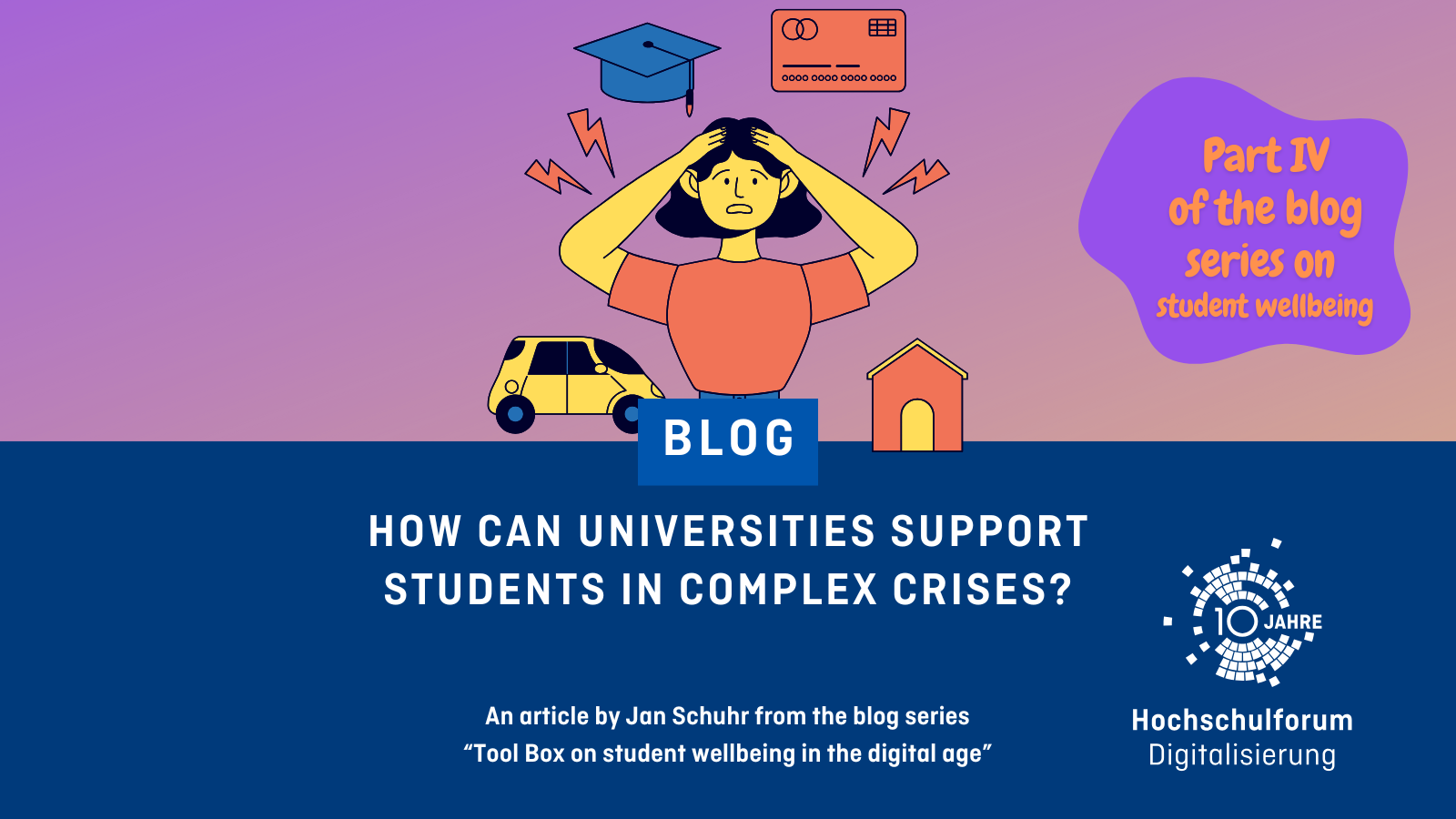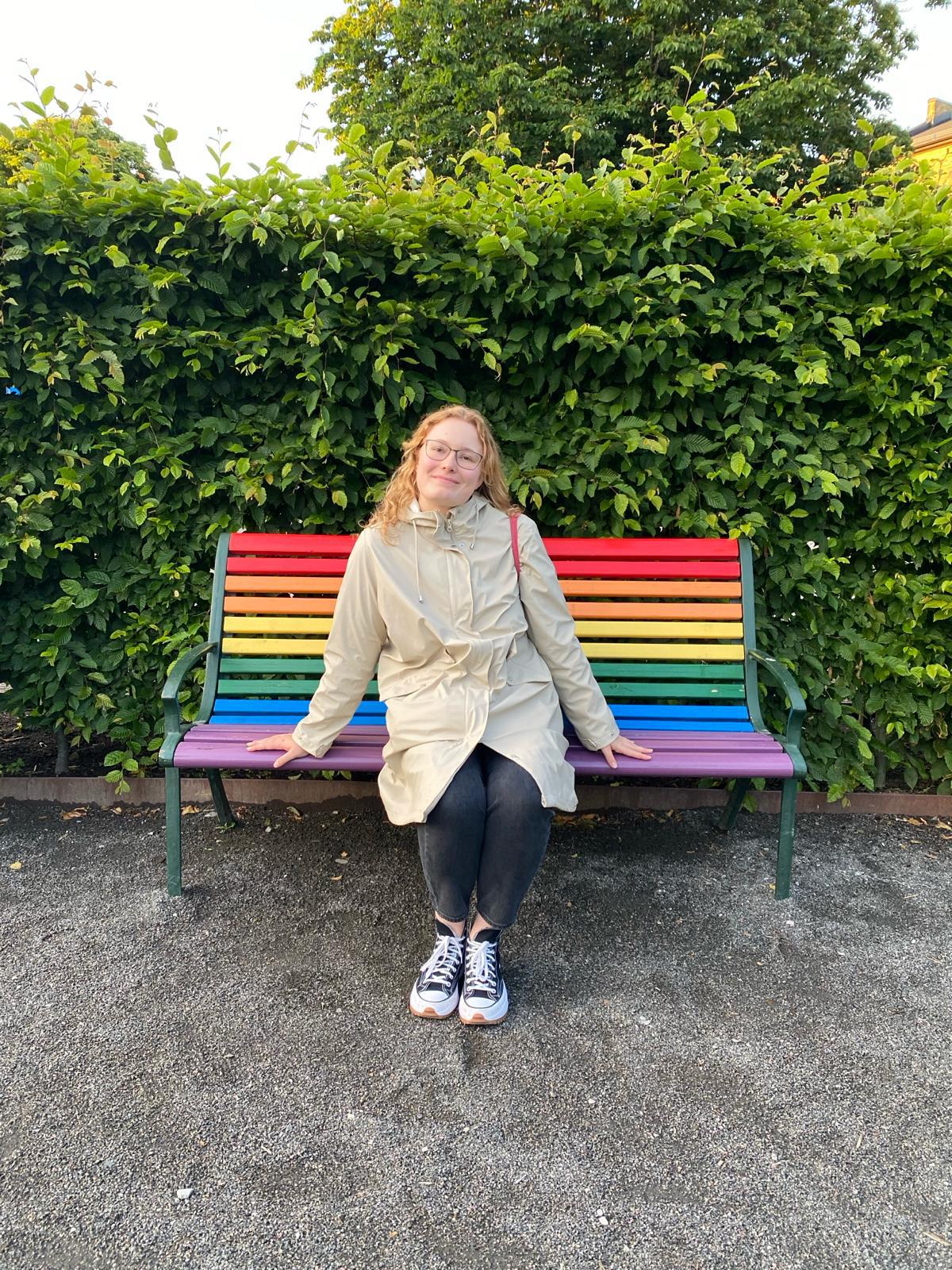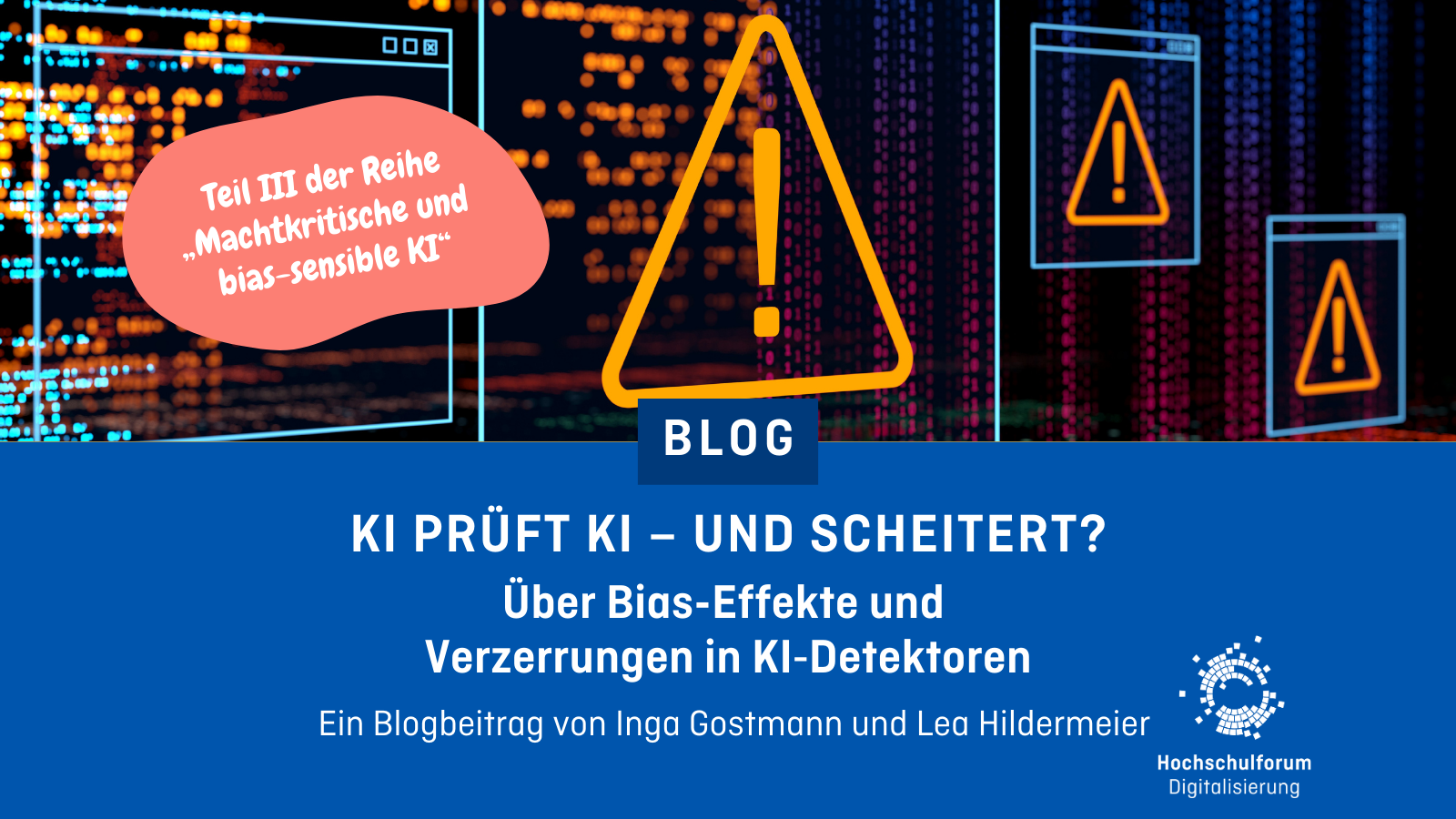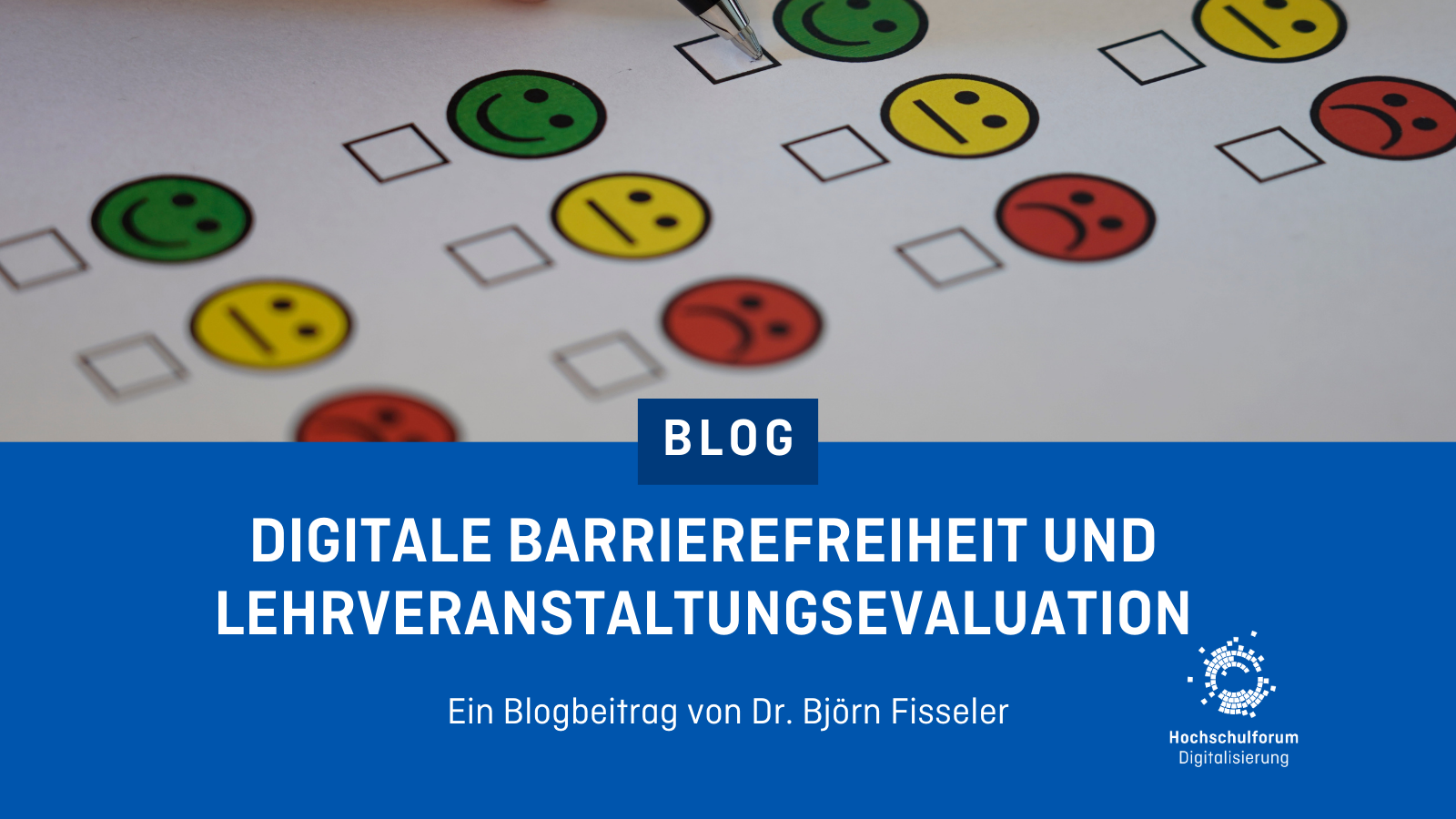How can universities support students in complex crises?
How can universities support students in complex crises?
18.09.24
The HFD blog series “Toolbox on Student Wellbeing in the Digital Age” deals with the relationship between student mental health and digitalization processes at universities. Tanja Brock and Jan Schuhr provide helpful ideas for promoting health in everyday university life in the form of a toolbox. In the fourth and final part of this blog series, complex crises among students are addressed and possibilities and limits are shown as to how lecturers can deal with these situations appropriately.
In the course of their professional biography, lecturers gain a variety of insights into students’ individual life situations. They are constantly making decisions about how to deal with the knowledge they gain about their respective lives. This also includes the students’ personal crises and extensive need for help. Current studies on the health and social situation of studentsand corridor discussions with colleagues highlight students’ personal cirses: Bullying, experiences of discrimination, suicidal tendencies, grief, sexual violence, clinical illnesses and other serious impairments. The pandemic has shown us that the increased use of digital study formats has an impact on the (in)visibility of individual characteristics and needs. This influences how people communicate their concerns and requires new ways of dealing with crises and difficult life situations for students. In the following, I would therefore like to discuss in more detail which tasks and actions are compatible with the role of the lecturer and promote an effective help process for students in complex crises. I understand “complex crises” to be situations or experiences in everyday teaching and study life which, as indicated in the examples above (“bullying, ….”), require an acute response to help.
This article is based on the qualitative study by Schuhr and Brock (2024) in which lecturers (n=8) and students (n=21) at Saxon universities were interviewed in summer semester 22 and winter semester 22/23 about their experiences and ways of dealing with psychological stress in everyday (digital) university life. Likewise, their own study experience (2015-2022) and the first teaching assignments from winter semester 22/23 onwards provided numerous impressions of the emergence and accompaniment of student crises, so that in the interests of transparency the following narrative is presented in the first-person perspective.
Responsibility and limits in the role of:the teacher
The teacher’s own positioning with regard to a suitable and appropriate (responsible) relationship, which they can adopt and on the basis of which they act, is primarily based on their own experience and individual moral views. The prerequisite for successful relationship work with students (in the context of crises as well as in everyday life) is to be aware of these resources, i.e. the knowledge from experience and one’s own moral views. Dies ermöglicht einerseits die Schaffung von Rollenklarheit, welche essentiell für die betroffenen Studierenden und einen gelungenen Hilfeverlauf ist. Andererseits wird die Mehrheit der Lehrenden, unabhängig davon, inwieweit sie involviert sein möchten, als Contact person for individual crises of students or witness them.
Targeted directed expectation management therefore seems obligatory and is also beneficial if a teacher is unable or unwilling to (actively) support certain problems. Proactively communicating one’s own boundaries is therefore a significant helpas this reduces the likelihood of experiencing rejection and disappointment when seeking help. (Fear of rejection is a key reason why students do not make use of psychological and social support services (Kosyluk et al., 2021)). Furthermore, especially in a challenging and stressful working environment such as higher education, there is also a need for concessions and measures for psychological self-protection. This does not mean not, opening the first meeting with the request not to disclose any private concerns, especially if these are particularly serious.
One possible hint could be:
The quotation example indicates the second central requirement for the role design of teachers: to act as a mediator between students and support services. The fact that university lecturers are mediators, i.e. link between student needs and other university departments are or should be a regular concern in the recommendations for action of the universities’ social and health-related service providers as well as in the statutoryduty of care for employed university lecturers. The actions and duties of the mediator depend on numerous factors and include, as in the example above, providing information on contact persons, but also immediately reporting cases of serious discrimination and sexual harassment and violence to the Rectorate and the official contact persons (see Rectorate of the University of Stuttgart, 2022).
The essential moment in the spectrum of different requirements, ideas and understandings of a mediator’s task for lecturers can be understood in such a way that university lecturers are empowered with skills that enable them to provide students with certain protection and assistance. This can be achieved proactively and preventively by providing information on the understanding of one’s own activities and responsibilities and those of other university bodies. Although this does not prevent the emergence of and confrontation with crises, it creates favorable conditions for a successful course taken with assistance and influences the narrative for dealing with individual crises. If teachers are confronted with having to react to a crisis observation on an ad hoc basis, this poses a major challenge of making the right decisions in the heat of the moment. This is a particular challenge although the role as a mediating actor has not changed ….
Informed stakeholders make informed decisions
… it is particularly important, however, that skills for effective support and transfer are available on an ad hoc basis. This requires understanding of individual crises and knowledge of how to access help and institutions. It is therefore important to understand the issue that has been identified as a crisis by the person concerned or by colleagues. This is due to the simple fact that experiences are always subjective and, in particular, when it comes to the acceptability of certain experiences and circumstances, the interpretation sovereignty lies with the person concerned The case and its quality as a crisis are therefore inseparable within the mediating aid treatment, even if the link contradicts the knowledge or the teacher’s own dogma of reason. It is therefore not up to the teacher, for example, to question the classification of the person affected by an experience as discrimination.
At the same time, validating an experience does not constitute a supportive reference or an understanding approach. For example, a “positive” evaluative reference can result in involvement in the course of the case, in which the teacher is held responsible for the outcome of (non-)assistance or the case assessment of the specialist unit is influenced. The probability that teachers react empathically and non-judgmentally to individual crises can be assumed to increase if this is combined with knowledge about the current situation of the students. The simplified mnemonic can first be used to understand the basic attitude and action that can be applied in response to a crisis observation:
In the second sentence, the other core aspect for help reactions becomes clear, the knowledge about access to help.. Dabei ist die Anforderung bezüglich des Zugangs hervorzuheben. Zwar ist ein Wissen über Hilfestellen fundamental für eine sinnvolle Bezugnahme zu den Bedarfen Studierender, welches u.a. durch den regen Stellenwechsel im Hochschulbetrieb von einer großen Organisation in die Nächste mit einem nicht unerheblichen Aufwand und in Eigeninitiative erarbeitet werden muss. For a person in crisis, however, contacting the relevant authorities is a much bigger challengethan it is for the majority of teachers. This does not mean that teachers, because it is supposedly easier for them, now have to take on, for example, the search for a therapy place. Within the university organization, however, a different (faster) reaction follows, for example, to the receipt of a message from a teacher’s e-mail address than to a message from a student’s e-mail address (although there are certainly also opposing experiences here).
Assuming that there is more direct communication between lecturers and other departments at a university (through a collegial relationship, the same office corridor, joint participation in staff meetings, etc.), or that they are at least closer to each other due to a similar daily work routine, the contact appears to have a lower threshold. Furthermore complex crises generally limit the scope of action to areas that are familiar and known to the person concernedas the majority of their own resources are taken up by the crisis or used to cope with everyday life. The fact that students turn to teachers in search of help can therefore also be due to the fact that other people and agencies in the respective life situation cannot be reached. This does not mean that teachers are responsible for the outcome of the help process, but they do have a significant influence on it.
These steps are helpful:
- Becoming aware of one’s own (mediator’s) role
- the creation of role clarity
- Transparency/expectation management
- Know and disseminate help resources
- Sensitivity to the subjective perception of the problem
This should be avoided:
- ignore the case
- take on the role of a therapist
- give unsolicited advice
- Make diagnoses
- Making insinuations
- question the legitimacy of the burden
Crisis guide for complex cases:
- University of Stuttgart guidelines for dealing with cases of discrimination, sexual harassment and sexualized violence
- Information brochure for university staff: Sexualized violence in digital university teaching
- Information brochure for university staff: Studying with mental illness and problems
- Recognizing psychological stress situations
- Interview guidelines for university employees,
- Dealing with acute suicide risk
Federal Ministry of Education and Research (BMBF) (2023) The student survey in Germany: 22nd Social Survey. The social and economic situation of students in Germany 2021
Kosyluk, K.A.; Conner, K.O.; Al-Khouja, M.; Bink, A.; Buchholz, B.; Ellefson, S.; Fokuo, K.; Goldberg, D.; Kraus, D.; Leon, A.; et al. Factors predicting help seeking for mental illness among college students. J. Ment. Health 2021, 30, 300-307.
Schuhr, J., Brock, T. (2024) University as a health location: What challenges and opportunities do digital teaching spaces offer for the psychosocial health and diversity of students? In: Witt et al. (eds.) Diversity and digitality in university teaching. Transcript publishing house, Bielfeld. 85-102 (Published on 27.08.2024)
Author

Jan Schuhr (he/him), sociologist M.A. at the Center for Research, Continuing Education and Counseling at ehs Dresden. Research associate in the ENHANCE project (Mental Health in the context of digitization processes at universities) and lecturer (obA) at the University of Applied Sciences for Social Work, Education and Nursing in Dresden. Current research interests include questions of health, organizational and digitalization sociology as well as empirical research strategies in the consideration of social inequalities
This blog post is part 4 of the blog series “Toolbox on Student Wellbeing in the Digital Age”. This is a cooperation between the ENHANCE project (Mental Health in the context of digitalization processes at universities) at EHS Dresden and the HFD think tank Well-Being in the digital age at universities under the direction of Tina Basner. Feel free to share your ideas with us and the HFD community via the comment function or contact us by e-mail at tina.basner@che.de.


 Theresa Sommer
Theresa Sommer 
 Inga Gostmann
Inga Gostmann 
 Dr. Björn Fisseler
Dr. Björn Fisseler 